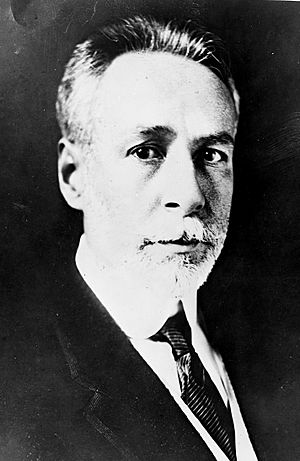Manuel Gondra facts for kids
Quick facts for kids
Manuel Gondra
|
|
|---|---|
 |
|
| 21st President of Paraguay | |
| In office 15 August 1920 – 31 October 1921 |
|
| Vice President | Félix Paiva |
| Preceded by | José Pedro Montero |
| Succeeded by | Félix Paiva |
| In office 25 November 1910 – 11 January 1911 |
|
| Vice President | Juan Bautista Gaona |
| Preceded by | Emiliano González Navero |
| Succeeded by | Albino Jara |
| Minister of Foreign Affairs of Paraguay | |
| In office 1 January 1913 – 23 January 1918 |
|
| Preceded by | Eusebio Ayala |
| Succeeded by | Eusebio Ayala |
| Minister of War and Navy of Paraguay | |
| In office 23 March 1912 – 1 January 1913 |
|
| Preceded by | Emiliano González Navero |
| Succeeded by | General Patricio Alejandrino Escobar |
| Minister of the Interior of Paraguay | |
| In office 4 July 1908 – 1 January 1909 |
|
| Preceded by | Manuel Benitez |
| Succeeded by | Manuel Franco |
| Personal details | |
| Born |
Manuel Gondra Pereira
1 January 1871 Buenos Aires, Argentina |
| Died | 8 March 1927 (aged 56) Asunción, Paraguay |
| Nationality | |
| Political party | Authentic Radical Liberal Party |
| Spouse | Emilia Victoria Alfaro |
| Children | 4 |
| Profession | Author, Journalist, Politician
Other offices
1905-1908: Plenipotentiary ambassador to Brazil
Paraguayan ambassador to the United States |
Manuel Gondra Pereira (born January 1, 1871 – died March 8, 1927) was a President of Paraguay. He served two times: first from November 25, 1910, to January 11, 1911, and again from August 15, 1920, to October 31, 1921. He was born in Buenos Aires, Argentina. Besides being a politician, he was also a writer and a journalist. He belonged to the Liberal Party.
His first time as president ended because of a military leader named Albino Jara. His second time ended due to a civil war in Paraguay in 1922. Gondra's group, called the Gondrists, won this war. Manuel Gondra passed away in Asunción, Paraguay, on March 8, 1927.
Contents
Early Life and Education
Manuel Gondra was born in Buenos Aires, Argentina, on January 1, 1871. He was a very good student in school. However, he decided to leave school early and did not get a diploma. Instead, he chose to teach himself many subjects. He studied social sciences, the history of the Americas, and geography. He became quite successful as a scholar.
Political Career and Diplomacy
Gondra's career as an intellectual paused when he joined the Revolution of 1904. He supported the Liberal side in this conflict. After the revolution, he became an ambassador to Brazil in 1905. An ambassador is a top diplomat who represents their country in another nation.
Because he worked so hard, he was later given more important roles. He became the Minister of the Interior, then the Minister of War and Navy. Later, he served as the Minister of Foreign Affairs for Paraguay. At one point, he also worked as an ambassador to the United States.
Serving as President of Paraguay
First Time as President
Manuel Gondra's first time running for president was very popular. Many smart people and regular citizens in Paraguay supported him. He became president on November 25, 1910. Paraguay was facing many problems at that time.
His presidency ended when Colonel Albino Jara led a sudden takeover on August 17, 1911. This happened even though Jara had similar political ideas to Gondra. This event was part of the Liberal political movement in Paraguay falling apart.
Second Time as President
After a lot of political confusion following Jara's takeover, Manuel Gondra decided to run for president again. He won the election and became president for the second time on August 15, 1920. However, this election caused some disagreements.
Right after he took office, supporters of the other candidate, Eduardo Schaerer, started to protest. This led to violence and became known as the Paraguayan Civil War. Gondra was forced to step down from his role on October 31, 1921, because of this conflict.
See also
 In Spanish: Manuel Gondra para niños
In Spanish: Manuel Gondra para niños

